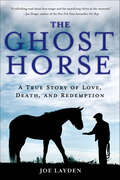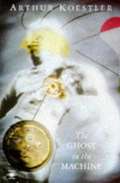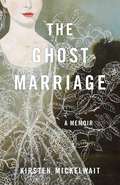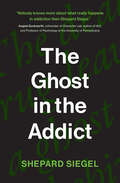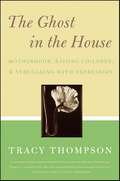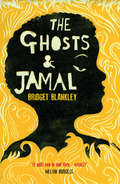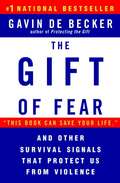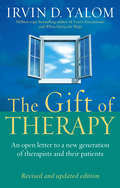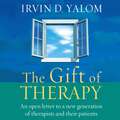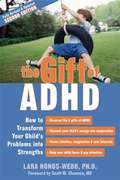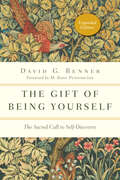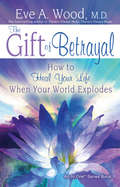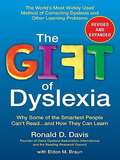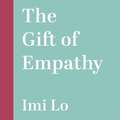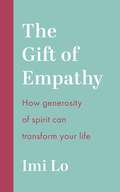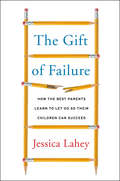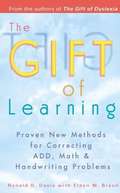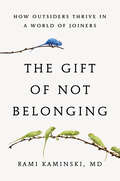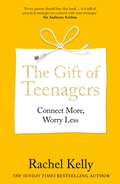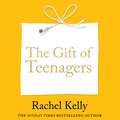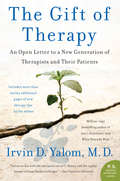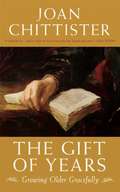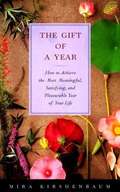- Table View
- List View
The Ghost Horse: A True Story of Love, Death, and Redemption
by Joe Layden“A rollicking read about how magic and the mystifying thrive at the racetrack” from the New York Times–bestselling author (Joe Drape, author of The Saint Makers).In The Ghost Horse, Joe Layden tells the inspiring true tale of a one-eyed, club-footed thoroughbred racehorse and a journeyman trainer, Tim Snyder, who scraped together every penny he had to purchase the broken and unwanted filly.Snyder helped the horse overcome its deficiencies, eventually naming her in part after his deceased wife, Lisa, the great and only love of his life—a bright and sweet-tempered woman whose gentle demeanor seemed eerily reflected in the horse. The trainer (and now owner) was by nature a crusty and combative sort, the yin to his wife’s yang, a racetrack lifer not easily moved by new-age mysticism or sentiment. And yet in those final days back in 2003, when Lisa Snyder lay in bed, her body ravaged by cancer, she reassured her family with a weak smile. “It’s okay,” she’d say. “I’ll see you again. I’m coming back as a horse.”Tim Snyder did not then believe in reincarnation. But he acknowledged the strangeness of this journey, the series of coincidences that brought them together, and the undeniable similarities between the horse and his late wife. And so did those who knew the couple well, and who could now only marvel at the story of the filly, Lisa’s Booby Trap, and the down-on-his-luck trainer who apparently had been given a new lease on life.The Ghost Horse is a powerful horseracing story of underdogs and second chances.“A heart-warming tale, artfully told.” —William Nack, author of Secretariat
The Ghost In The Machine
by Arthur Koestlerfrom the book's back cover: In The Sleepwalkers and The Act of Creation Arthur Koestler provided pioneering studies of scientific discovery and artistic inspiration, the twin pinnacles of human achievement. The Ghost in the Machine looks at the dark side of the coin: our terrible urge to self-destruction... Could the human species be a gigantic evolutionary mistake? To answer that startling question Koestler examines how experts on evolution and psychology all too often write about people with an 'antiquated slot-machine model based on the naively mechanistic world-view of the nineteenth century'. His brilliant polemic helped to instigate a major revolution in the life sciences, yet its 'glimpses of an alternative world-view' form only the background to an even more challenging analysis of the human predicament. Perhaps, he suggests, we are a species in which ancient and recent brain structures - or reason and emotion -- are not fully co-ordinated. Such in-built deficiencies may explain the paranoia, violence and insanity that are central strands of human history. And however disturbing we find such issues, Koestler contends, it is only when we face our limitations head-on that we can hope to find a remedy.
The Ghost Marriage: A Memoir
by Kirsten MickelwaitAt thirty-one, Kirsten has just returned to San Francisco from a bohemian year in Rome, ready to pursue a serious career as a writer and eventually, she hopes, marriage and family. When she meets Steve Beckwith, a handsome and successful attorney, she begins to see that future materialize more quickly than she&’d dared to expect. Twenty-two years later, Steve has turned into someone quite different. Unemployed and addicted to opioids, he uses money and their two children to emotionally blackmail Kirsten. What&’s more, he&’s been having an affair with their real estate agent, who is also her close friend. So she divorces him—but after their divorce is finalized, Steve is diagnosed with colon cancer and dies within a year, leaving Kirsten with $1.5 million in debts she knew nothing about. It&’s then that she finally understands: The man she&’d married was a needy, addictive person who came wrapped in a shiny package.As she fights toward recovery, Kirsten begins to receive communications from Steve in the afterlife—which lead her on an unexpected path to forgiveness. The Ghost Marriage is her story of discovery—that life isn&’t limited to the tangible reality we experience on this earth, and that our worst adversaries can become our greatest teachers.
The Ghost in the Addict
by Shepard SiegelHow withdrawal distress and cravings can haunt current and former addicts, and what they can teach us about addiction and its treatments.&“The dead drug leaves a ghost behind. At certain hours it haunts the house,&” Jean Cocteau once wrote. In The Ghost in the Addict, Shepard Siegel offers a Pavlovian analysis of drug use. Chronic drug use, he explains, conditions users to have an anticipatory homeostatic correction, which protects the addict from overdose. This drug-preparatory response, elicited by drug-paired cues, is often mislabeled a &“withdrawal response.&” The withdrawal response, however, is not due to the baneful effects of previous drug administrations; rather, it is due to the body&’s preparation for the next drug administration—a preparatory response that can haunt addicts like a ghost long after they have conquered their usage.Examining the failure of legislation, the circumstances of overdose, and the cues that promote drug use, Siegel seeks to counter the widespread belief that addiction is evidence of a pathology. Instead, he proposes that the addict has an adaptive, learned response to the physiological changes wrought by drug use. It is only through understanding so-called withdrawal symptoms as a Pavlovian response, he explains, that we can begin to understand why addicts experience cravings long after their last drug use.
The Ghost in the House: Motherhood, Raising Children, & Struggling with Depression
by Tracy ThompsonAn award-winning reporter for the Washington Post, Tracy Thompson was thirty-four when she was hospitalized and put on suicide watch during a major depressive episode. This event, the culmination of more than twenty years of silent suffering, became the point of departure for an in-depth, groundbreaking book on depression and her struggle with the disease. The Beast shattered stereotypes and inspired countless readers to confront their own battles with mental illness. Having written that book, and having found the security of a happy marriage, Thompson assumed that she had learned to manage her illness. But when she took on one of the most emotionally demanding jobs of all—being a mother—depression returned with fresh vengeance.Very quickly Thompson realized that virtually everything she had learned up to then about dealing with depression was now either inadequate or useless. In fact, maternal depression was a different beast altogether. She tackled her problem head-on, meticulously investigating the latest scientific research and collecting the stories of nearly 400 mothers with depression. What she found was startling: a problem more widespread than she or any other mother struggling alone with this affliction could have imagined. Women make up nearly 12 million of the 19 million Americans affected by depression every year, experiencing episodes at nearly twice the rate that men do. Women suffer most frequently between the ages of twenty-five and forty-four—not coincidentally, the primary childbearing years.The Ghost in the House, the result of Thompson's extensive studies, is the first book to address maternal depression as a lifelong illness that can have profound ramifications for mother and child. A striking blend of memoir and journalism, here is an invaluable resource for the millions of women who are white-knuckling their way through what should be the most satisfying years of their lives. Thompson offers her readers a concise summary of the cutting-edge research in this field, deftly written prose, and, above all, hope.
The Ghosts & Jamal
by Bridget BlankleyA heroic journey made by a boy who wasn't born to be a hero. Waking up in the aftermath of a terrorist attack, 13-year-old Jamal sets out to find out why the rules he grew up with no longer apply and how he fits into the new world that he finds himself in. The Ghosts & Jamal is an original and compelling novel, exploring prejudice and exploitation as well as friendship and hope. Faith, violence, and societal attitudes towards disability form a thought-provoking backdrop to this story of immense bravery, exploring how we face our fears as we learn to do what is right. Jamal holds up a mirror to violence-driven societies everywhere. While trying to evade capture by his attackers, Jamal tries to piece together what has happened. Will he survive his quest to find out who or what is responsible for the death of his family?
The Gift Of Fear: And Other Survival Signals That Protect Us From Violence
by Gavin De BeckerTrue fear is a gift. Unwarranted fear is a curse. Learn how to tell the difference. <p><p> A date won't take "no" for an answer. The new nanny gives a mother an uneasy feeling. A stranger in a deserted parking lot offers unsolicited help. The threat of violence surrounds us every day. But we can protect ourselves, by learning to trust—and act on—our gut instincts. <p> In this empowering book, Gavin de Becker, the man Oprah Winfrey calls the nation's leading expert on violent behavior, shows you how to spot even subtle signs of danger—before it's too late. Shattering the myth that most violent acts are unpredictable, de Becker, whose clients include top Hollywood stars and government agencies, offers specific ways to protect yourself and those you love, including...how to act when approached by a stranger...when you should fear someone close to you...what to do if you are being stalked...how to uncover the source of anonymous threats or phone calls...the biggest mistake you can make with a threatening person...and more. Learn to spot the danger signals others miss. It might just save your life.
The Gift Of Therapy (Revised And Updated Edition): An open letter to a new generation of therapists and their patients
by Irvin YalomTHE GIFT OF THERAPY is the culmination of master psychiatrist Dr Irvin Yalom's thirty-five years' work as a therapist, illustrating through real case studies how patients and therapists alike can get the most out of therapy. Presented as eighty-five 'tips' for 'beginner therapists', Yalom shares his own fresh approach and the insights he has gained while treating his patients. Personal, and sometimes provocative, Yalom makes some unorthodox suggestions, including: Let the patient matter to you; Acknowledge your errors; Create a new therapy for each patient; Make home visits; (Almost) never make decisions for a patient; and Freud was not always wrong. This is an entertaining, informative and insightful read for both beginners and more experienced therapists, patients, students and everyone with an interest in the subject.
The Gift Of Therapy: An open letter to a new generation of therapists and their patients
by Irvin YalomAcclaimed author and renowned psychiatrist Irvin D. Yalom distills thirty-five years of psychotherapy wisdom into one brilliant volume.The culmination of master psychiatrist Dr. Irvin D. Yalom's more than thirty-five years in clinical practice, The Gift of Therapy is a remarkable and essential guidebook that illustrates through real case studies how patients and therapists alike can get the most out of therapy. The bestselling author of Love's Executioner shares his uniquely fresh approach and the valuable insights he has gained-presented as eighty-five personal and provocative 'tips for beginner therapists', including:*Let the patient matter to you*Acknowledge your errors*Create a new therapy for each patient*Do home visits*(Almost) never make decisions for the patient*Freud was not always wrongA book aimed at enriching the therapeutic process for a new generation of patients and counsellors, Yalom's Gift of Therapy is an entertaining, informative, and insightful read for anyone with an interest in the subject.
The Gift of ADHD: How to Transform Your Child's Problems into Strengths (Second Edition)
by Lara Honos-WebbThis second edition of The Gift of ADHD includes compelling new research indicating that the impulses that lead your child to act exuberantly may correspond with unusual levels of creativity and a heightened capacity for insight into the feelings and emotions of others. <P><P>Lara Honos-Webb presents the evidence for this revolutionary concept and explains how you can help your child develop control over inattentive, hyperactive behavior and enhance the five gifts of ADHD: creativity, attunement to nature, interpersonal intuition, energetic enthusiasm, and emotional sensitivity. <P><P>Filled with easy skill-building activities you and your child can do together, this book will help your child transform problematic symptoms into strengths, then build the self-esteem they need to let those gifts shine.
The Gift of Being Yourself: The Sacred Call to Self-Discovery (The Spiritual Journey)
by David G. Benner"Grant, Lord, that I may know myself that I may know thee." —Augustine Much is said in Christian circles about knowing God. But Christians throughout the ages have agreed that there cannot be deep knowledge of God without deep knowledge of the self. Discerning your true self is inextricably related to discerning God's purposes for you. Paradoxically, the more you become like Christ, the more you become authentically yourself. In this profound exploration of Christian identity, psychologist and spiritual director David G. Benner illuminates the spirituality of self-discovery. He exposes the false selves that you may hide behind and calls you to discover the true self that emerges from your uniqueness in Christ. Freeing you from illusions about yourself, Benner shows that self-understanding leads to the fulfillment of your God-given destiny and vocation. Rest assured, you need not try to be someone you are not. But you will deepen your experience of God through discovering the gift of being yourself. This expanded edition, one of three titles in The Spiritual Journey trilogy, includes a new epilogue and an experiential guide with questions for individual reflection or group discussion.
The Gift of Betrayal: How To Heal Your Life When Your World Explodes
by Eve A. WoodYou’ve been betrayed by a loved one. But, you are not alone. Join esteemed psychiatrist, relationship expert and prolific author, Eve A. Wood, M.D., in this life altering workshop. Learn how to heal your life after this horrendous experience. What feels like a curse is really a blessing in disguise. Eve ought to know. She’s been there herself. And she’s helped hundreds of others heal their lives after gut-wrenching betrayals. You too can climb out of the pit of despair and live your heart’s desire. But you need to know how to do it. In this workshop, based on Eve’s most recent book, The Gift of Betrayal, you will: - Learn and practice the 14 key lessons to heal your life - Take a series of specific action steps to create your heart’s desire - Develop a personal transformation mission statement for continued self-healing at home. Discover the roles of anger, blame, forgiveness, personal history, mindset, friendship, attitude, belief, spirituality, sexuality, passion, hope, and faith in healing. Draw on sharing exercises, reflective techniques, guided imagery, writing, and cognitive, and behavioral interventions to find your own unique path to wholeness and joy. You can create a glorious future. You will be successful!
The Gift of Dyslexia, Revised and Expanded
by Davis Ronald D.The revised, updated, and expanded edition of the classic in the category. This book outlines a unique and revolutionary program with a phenomenally high success rate in helping dyslexics learn to read and to overcome other difficulties associated with it. This new edition is expanded to include new teaching techniques and revised throughout with up-to-date information on research, studies, and contacts.
The Gift of Empathy: How generosity of spirit can transform your life
by Imi LoWhat is empathy? Can it be depleted? Can you empathize with those who've hurt you? Do you grapple with an excess of empathy that leaves you drained? Why is it often hardest to muster empathy for those we love? These questions might be what led you to pick up this book.Empathy is that profound moment when we step into someone else's shoes, perceive the world through their eyes, and genuinely understand their emotions. It's the bridge connecting us and the compass guiding us toward deeper connections. Yet, despite knowing empathy's value, there are times when it seems just beyond our reach.One of the most perplexing aspects of empathy is how we extend it to those who've harmed us. How do we show understanding to those who've caused us pain or mistreated us? Is empathy inherent, or can it be developed through training? These questions test our emotional boundaries, and in this book, we address them directly.Within these pages, we explore the complexities of coping with unempathetic parents, emotionally unavailable partners, and challenging work relationships. You'll gain practical tools for extending empathy and navigating the dynamics of family and groups. You'll also learn to balance empathy with self-respect, establish boundaries, and tend to your emotional needs.If you've ever struggled with empathy-feeling like you have either too much or too little-then this book is for you. It is as a guide to mend broken relationships, nurture deeper connections, and enhance self-love. Ultimately, you may come to view empathy not as something that drains you, but as a priceless gift that multiplies when shared.
The Gift of Empathy: How generosity of spirit can transform your life
by Imi LoWhat is empathy? Can it be depleted? Can you empathize with those who've hurt you? Do you grapple with an excess of empathy that leaves you drained? Why is it often hardest to muster empathy for those we love? These questions might be what led you to pick up this book.Empathy is that profound moment when we step into someone else's shoes, perceive the world through their eyes, and genuinely understand their emotions. It's the bridge connecting us and the compass guiding us toward deeper connections. Yet, despite knowing empathy's value, there are times when it seems just beyond our reach.One of the most perplexing aspects of empathy is how we extend it to those who've harmed us. How do we show understanding to those who've caused us pain or mistreated us? Is empathy inherent, or can it be developed through training? These questions test our emotional boundaries, and in this book, we address them directly.Within these pages, we explore the complexities of coping with unempathetic parents, emotionally unavailable partners, and challenging work relationships. You'll gain practical tools for extending empathy and navigating the dynamics of family and groups. You'll also learn to balance empathy with self-respect, establish boundaries, and tend to your emotional needs.If you've ever struggled with empathy-feeling like you have either too much or too little-then this book is for you. It is as a guide to mend broken relationships, nurture deeper connections, and enhance self-love. Ultimately, you may come to view empathy not as something that drains you, but as a priceless gift that multiplies when shared.
The Gift of Empathy: How generosity of spirit can transform your life
by Imi LoWhat is empathy? Can it be depleted? Can you empathize with those who've hurt you? Do you grapple with an excess of empathy that leaves you drained? Why is it often hardest to muster empathy for those we love? These questions might be what led you to pick up this book.Empathy is that profound moment when we step into someone else's shoes, perceive the world through their eyes, and genuinely understand their emotions. It's the bridge connecting us and the compass guiding us toward deeper connections. Yet, despite knowing empathy's value, there are times when it seems just beyond our reach.One of the most perplexing aspects of empathy is how we extend it to those who've harmed us. How do we show understanding to those who've caused us pain or mistreated us? Is empathy inherent, or can it be developed through training? These questions test our emotional boundaries, and in this book, we address them directly.Within these pages, we explore the complexities of coping with unempathetic parents, emotionally unavailable partners, and challenging work relationships. You'll gain practical tools for extending empathy and navigating the dynamics of family and groups. You'll also learn to balance empathy with self-respect, establish boundaries, and tend to your emotional needs.If you've ever struggled with empathy-feeling like you have either too much or too little-then this book is for you. It is as a guide to mend broken relationships, nurture deeper connections, and enhance self-love. Ultimately, you may come to view empathy not as something that drains you, but as a priceless gift that multiplies when shared.
The Gift of Failure: How the Best Parents Learn to Let Go So Their Children Can Succeed
by Jessica LaheyThe New York Times bestselling, groundbreaking manifesto on the critical school years when parents must learn to allow their children to experience the disappointment and frustration that occur from life’s inevitable problems so that they can grow up to be successful, resilient, and self-reliant adultsModern parenting is defined by an unprecedented level of overprotectiveness: parents who rush to school at the whim of a phone call to deliver forgotten assignments, who challenge teachers on report card disappointments, mastermind children’s friendships, and interfere on the playing field. As teacher and writer Jessica Lahey explains, even though these parents see themselves as being highly responsive to their children’s well being, they aren’t giving them the chance to experience failure—or the opportunity to learn to solve their own problems.Overparenting has the potential to ruin a child’s confidence and undermine their education, Lahey reminds us. Teachers don’t just teach reading, writing, and arithmetic. They teach responsibility, organization, manners, restraint, and foresight—important life skills children carry with them long after they leave the classroom.Providing a path toward solutions, Lahey lays out a blueprint with targeted advice for handling homework, report cards, social dynamics, and sports. Most importantly, she sets forth a plan to help parents learn to step back and embrace their children’s failures. Hard-hitting yet warm and wise, The Gift of Failure is essential reading for parents, educators, and psychologists nationwide who want to help children succeed.
The Gift of Learning
by Davis Ronald D.Using the proven methods he developed to overcome dyslexia, Ron Davis adapts those techniques to help sufferers triumph over a variety of common learning disabilities, including: â ¬ Attention Deficit Disorder (ADD)â ¬ ADHD (the hyperactive variety)â ¬ Math deficiency (dyscalculia and acalculia)â ¬ Handwriting problems (dysgraphia and agraphia) Outlining clear instructions, the author demonstrates that through a series of mental and physical exercises called Orientation Counseling and learning tools called Symbol Mastery, those struggling with these conditions can now learn how to correct them, embrace their gift, and enjoy learning.
The Gift of Not Belonging: How Outsiders Thrive in a World of Joiners
by Rami KaminskiFrom a renowned psychiatrist comes the first book to explore the otrovert personality—someone who feels like an outsider in any group—revealing all the advantages of being an otrovert. Were you the kid who never wanted to join after school clubs or go to sleepaway camp? Do you loathe parties but love spending time with close friends one-on-one? Are you allergic to teamwork but thrive creatively and professionally when working alone? Do you struggle to fit in? If so, you are likely an otrovert. Otroverts are not natural born joiners. Unlike introverts, they are not shy or quiet, and do not quickly tire from one-on-one socializing. Yet in large groups they feel uncomfortable, alienated, and alone. Unlike those who have been excluded or marginalized, otroverts are embraced and often quite popular. Yet they never feel like they truly belong. In a culture that puts a premium on joining, many otroverts have gone through life feeling misunderstood. But, contrary to what we have been taught, argues psychiatrist Rami Kaminski, belonging is not a requirement for living a rich, rewarding life. Quite the opposite. When you have no affinity for a particular group, your self-worth is not conditioned on the group&’s approval. You can enjoy deep connection in individual relationships without the obligation to follow the rules the group follows, or care about what the group cares about. Best of all, you know of no other way to think or be, other than for yourself.The Gift of Not Belonging urges otroverts to embrace their unique gifts, and equips them with the knowledge and tools to thrive in a communal world.
The Gift of Teenagers: Connect More, Worry Less
by Rachel Kelly'Rachel's book is full of wisdom and support. I love that she has a consistently compassionate viewpoint - both towards teenagers and the ones raising them' - SOPHIE ELLIS BEXTOR'Every parent should buy this book...it is full of practical strategies to connect with your teenager' - SIR ANTHONY SELDON'A masterful account of the parenting teens journey, weaving personal anecdotes with brain science and relationship psychology' - JANEY DOWNSHIREWe live in a time of huge worry about our teenagers and their mental health - from fears of a phone-obsessed adolescence to concerns about an offline world of bullying and drugs, not to mention gender identity. But what if we parents don't need to be so fearful? What if our teenagers are a gift we can all learn from? In this authoritative book by an established mental health writer with advice from experts in the field, Rachel Kelly shares how bringing up her five children in an anxious age, and her work for ten years with young people in schools and at universities, has led to her own psychological growth. Raising resilient teenagers begins with becoming a more resilient - and better informed - parent, someone who has learned to manage their own emotions, become aware of their parenting style, and understand the world our teenagers are growing up in.Thus armed, we can engage with our adolescents better and discover how they, and their brains, work (short answer: not always like us!). The book also offers psychologically helpful (and evidence-based) approaches for supporting our teenagers, from personal relationships to navigating social media. Whisper it, but it might even be a fun ride.
The Gift of Teenagers: Connect More, Worry Less
by Rachel Kelly'Rachel's book is full of wisdom and support. I love that she has a consistently compassionate viewpoint - both towards teenagers and the ones raising them' - SOPHIE ELLIS BEXTOR'Every parent should buy this book...it is full of practical strategies to connect with your teenager' - SIR ANTHONY SELDON'A masterful account of the parenting teens journey, weaving personal anecdotes with brain science and relationship psychology' - JANEY DOWNSHIREWe live in a time of huge worry about our teenagers and their mental health - from fears of a phone-obsessed adolescence to concerns about an offline world of bullying and drugs, not to mention gender identity. But what if we parents don't need to be so fearful? What if our teenagers are a gift we can all learn from? In this authoritative book by an established mental health writer with advice from experts in the field, Rachel Kelly shares how bringing up her five children in an anxious age, and her work for ten years with young people in schools and at universities, has led to her own psychological growth. Raising resilient teenagers begins with becoming a more resilient - and better informed - parent, someone who has learned to manage their own emotions, become aware of their parenting style, and understand the world our teenagers are growing up in.Thus armed, we can engage with our adolescents better and discover how they, and their brains, work (short answer: not always like us!). The book also offers psychologically helpful (and evidence-based) approaches for supporting our teenagers, from personal relationships to navigating social media. Whisper it, but it might even be a fun ride.
The Gift of Teenagers: Connect More, Worry Less
by Rachel Kelly'Rachel's book is full of wisdom and support. I love that she has a consistently compassionate viewpoint - both towards teenagers and the ones raising them' - SOPHIE ELLIS BEXTOR'Every parent should buy this book...it is full of practical strategies to connect with your teenager' - SIR ANTHONY SELDON'A masterful account of the parenting teens journey, weaving personal anecdotes with brain science and relationship psychology' - JANEY DOWNSHIREWe live in a time of huge worry about our teenagers and their mental health - from fears of a phone-obsessed adolescence to concerns about an offline world of bullying and drugs, not to mention gender identity. But what if we parents don't need to be so fearful? What if our teenagers are a gift we can all learn from? In this authoritative book by an established mental health writer with advice from experts in the field, Rachel Kelly shares how bringing up her five children in an anxious age, and her work for ten years with young people in schools and at universities, has led to her own psychological growth. Raising resilient teenagers begins with becoming a more resilient - and better informed - parent, someone who has learned to manage their own emotions, become aware of their parenting style, and understand the world our teenagers are growing up in.Thus armed, we can engage with our adolescents better and discover how they, and their brains, work (short answer: not always like us!). The book also offers psychologically helpful (and evidence-based) approaches for supporting our teenagers, from personal relationships to navigating social media. Whisper it, but it might even be a fun ride.
The Gift of Therapy: An Open Letter to a New Generation of Therapists and Their Patients
by Irvin YalomThe culmination of master psychiatrist Dr. Irvin D. Yalom's more than thirty-five years in clinical practice, The Gift of Therapy is a remarkable and essential guidebook that illustrates through real case studies how patients and therapists alike can get the most out of therapy. The bestselling author of Love's Executioner shares his uniquely fresh approach and the valuable insights he has gained--presented as eighty-five personal and provocative "tips for beginner therapists," including: Let the patient matter to you Acknowledge your errors Create a new therapy for each patient Do home visits (Almost) never make decisions for the patient Freud was not always wrong A book aimed at enriching the therapeutic process for a new generation of patients and counselors, Yalom's Gift of Therapy is an entertaining, informative, and insightful read for anyone with an interest in the subject.
The Gift of Years: Growing Older Gracefully
by Joan ChittisterJoan Chittister, one of our most celebrated spiritual writers, invites us to embrace older age as a natural part of life that is both active and contemplative, productive and reflective, and deeply rewarding. She encourages us to cherish the blessings of aging and to overcome its challenges, and shows us that this is a special period of life--maybe the most special of them all. Older age gives us wisdom, freedom, and prosperity of another kind. Older age enlightens--not simply ourselves, but also those around us. To live these years well, we need to look at every one of them head up and alive. Life is not about the length of years we manage to eke out of it. It is about living into the values offered every day; about growing older with grace. Not only accepting but also celebrating getting old, this inspirational and illuminating work looks at the many facets of the aging process, from purposes and challenges to struggles and surprises. Central throughout is a call to cherish the blessing of aging as a natural part of life that is active, productive, and deeply rewarding. Perhaps the most important dimension revealed lies in the awareness that there is a purpose to aging and intention built into every stage of life. Chittister reflects on many key issues, including the temptation towards isolation, the need to stay involved, the importance of health and well-being, what happens when old relationships end or shift, the fear of tomorrow, and the mystery of forever. Readers are encouraged to surmount their fears of getting older and find beauty in aging well.
The Gift of a Year: How to Achieve the Most Meaningful, Satisfying, and Pleasurable Year of Your Life
by Mira KirshenbaumHOW OFTEN HAVE YOU SAID TO YOURSELF, "IF I ONLY HAD THE TIME..."? This inspiring, one-of-a-kind book tells you how to give yourself the time you're longing for--starting right now... with the gift of one special year. Are you so caught up in your busy life that you've lost sight of you? Do you fantasize about the things you'd do if only you weren't so bogged down with family and career responsibilities? What would you give to make those fantasies a reality? In The Gift of a Year, Mira Kirshenbaum shows you how to take your dreams off the back burner and make them a vital and enriching part of your life. And she shows how every woman can do it--even if you can't take a year off, you can take a year for yourself. You'll be amazed at the unlimited possibilities you'll find once you give yourself permission to explore the essential relationship that has somehow gotten lost in the domestic/professional shuffle: the relationship with yourself. The idea is simple: You give yourself one year to do something you've always wanted to do, whether it's undertaking a major challenge or merely recharging your batteries. The opportunities are as abundant as your dreams. You can go back to school... get in shape... climb a mountain... indulge in daily bubble baths... switch careers... work on a relationship... paint a landscape... start a business... get on top of a problem or take a break from it... or do something you've put off for years--something you've thought about but never got around to doing. The Gift of a Year takes you step by step through this process of self-exploration, discovery, and revitalization, and offers practical advice, guidance, and inspiration along the way, from the "Ten Dream-Discovering Questions" that help you learn what you really want, to "Getting Everyone on Board" for the support you need to make it happen all the way, to how your special year can change your life. This inspirational book is filled with empowering, real- life stories of women who have given themselves the gift of a year, including why and how they did it, what they got out of it, and what they did afterward. You'll also find checklists and quizzes to help you incorporate this unique plan into your everyday existence. Reading The Gift of a Year will make your life more meaningful, more fulfilling, and, most of all, more your own.
